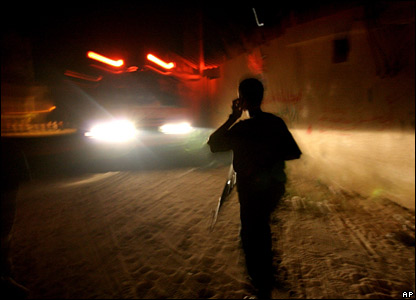Kidnappers give Israel deadline to release prisoners
 Israel are continuing to refuse to release any Palestinian prisoners as the deadline set by the captors of Gilad Shalit approaches.
Israel are continuing to refuse to release any Palestinian prisoners as the deadline set by the captors of Gilad Shalit approaches.
However, there are signs that this stance is not universally popular amongst Israelis.
After reports in the Israeli media suggesting that some high-ranking Israeli officers were in favour of releasing some Palestinian prisoners in exchange for Cpl Shalit being handed over alive and safe, Dan Halutz, the IDF's chief of staff, sounded a somewhat more tentative note than Mr Olmert's office.
After visiting the corporal's family, General Halutz refrained from answering with a direct negative when asked by reporters if Israel should negotiate. "We, and by that I mean the political and military echelons, will consider all that there is to be considered, then reach conclusions and act on them," he said.
Noam Shalit, the abducted corporal's father, yesterday sounded a criticial note about the army's operation, saying it was "delusional" that Israel should re-establish its "deterrence" at the expense of his son. While saying he would await the inquiryinto the raid in which his son was seized, he told Channel Ten: "Israel should have done that before the attack, when there was intelligence information on tunnels being dug in the region."
Saying it was getting "harder and harder to cope" Mr Shalit added: "As the number one soldier in Israel, I asked the chief of staff to represent Gilad's interests, as a soldier sent by the army, as soldier to soldier, that he represent Gilad's interest to Israel and to the decision-making echelons."
Israeli Deputy Prime Minister and Nobel Peace Prize winner Shimon Perez appeared on CNN and took part in the following exchange.
ROBERTS: Vice Premier Peres, the question is, is this operation harming the Palestinian people as much or more than it's harming the Hamas government?You'll notice that Mr Perez makes no distinction of any kind between the Palestinian military group who have seized Gilad Shalit and the ordinary citizens of the Gaza Strip. Both, apparently, have equal ability to ensure the young soldiers release and, therefore, both equally are ripe for punishment.
PERES: Well, they can get rid of it in one moment. If they would release the soldier, the operation will be over in a moment's time. It is up to them. But they cannot keep the soldier as a hostage and then complain.
By the way, when it comes to electricity, we checked beforehand. If the hospitals have generators to supply the necessary electricity to the people who are in hospital, we wouldn't bomb otherwise. But if they want to change the situation, it's in their hands. They don't have to complain.
Israel have a long history of negotiating prisoner exchanges with her enemies, who have often used hostage taking as a political tool.
In 1985 Israel agreed to the release of more than 1,150 Palestinian prisoners in return for three soldiers taken captive in Lebanon.
Many in Israeli society are questioning why the government are not resorting to this methodology again, especially as many of the Palestinians arrested are taken into custody especially so that they may be used as bargaining tools in this kind of situation.
There are many people, myself included, who begin to think that Israel care less about the fate of Mr Shalit than they do about stopping Hamas emerging as a future negotiating partner. Their present actions in Gaza are not really about the release of Gilad Shalit, they are about the destruction of the government of Hamas.
Click title for full article.























No comments:
Post a Comment